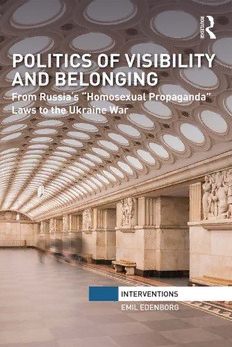
Politics of Visibility and Belonging: From Russia ́s “Homosexual Propaganda” Laws to the Ukraine War PDF
Preview Politics of Visibility and Belonging: From Russia ́s “Homosexual Propaganda” Laws to the Ukraine War
This is an important book in which the role of visibility in general and the media as its facilitator in particular is added to the theorization of political projects of belonging. It focuses on fascinating contesting case studies from the Russian media but is of generic theoretical and political importance as well. Professor Nira Yuval-Davis, Director of the research centre on Migration, Refugees and Belonging, University of East London This page intentionally left blank Politics of Visibility and Belonging In this book, Edenborg studies contemporary conflicts of belonging as enacted in Russian media, from the “homosexual propaganda” laws to the Sochi Olympics and the Ukraine war, and explores the role of visibility in the production and contestation of belonging to a political community. Thebookexamineswhatit isthatdetermineswhich subjects and narratives become visible and which are occluded in public spheres; how they are seen and made intelligible; and how those processes are involved in the imagina- tionofcommunities.Investigatingthedifferentiatedconsequencesofvisibility, Edenborgdiscusseswhatformsofvisibilitymakebelongingpossibleandwhat forms of visibility may be related to exclusion or violence. The book maps and analyzes the practices and mechanisms whereby a state seeks to produce and shape belonging through controlling what becomes visible in public, and how that which becomes visible is seen and understood. In addition, it examineswhat forms contestation can take andwhat its effects may be. Advancing theoretical understanding and offering a useful way to analyti- cally conceptualize the role of visibility in the production and contestation of political communities, thiswork will be ofinterest to students and scholars of gender and sexuality politics, borders, citizenship, nationalism, migration and ethnic relations. Emil Edenborg is Postdoctoral Researcher at Södertörn University, Sweden. Interventions Edited by: JennyEdkins,AberystwythUniversityandNickVaughan-Williams, UniversityofWarwick The series provides a forum for innovative and interdisciplinary work that engages with alternative critical, post-structural, feminist, postcolonial, psy- choanalytic and cultural approaches to international relations and global politics. In our first 5 yearswe have published 60 volumes. We aim to advance understanding of the key areas in which scholars working within broad critical post-structural traditions have chosen to make their interventions, and to present innovative analyses of important topics. Titles in the series engage with critical thinkers in philosophy, sociology, pol- itics and other disciplinesandprovidesituatedhistorical,empiricalandtextual studiesin international politics. We are very happy to discuss your ideas at any stage of the project: just contact us for advice or proposal guidelines. Proposals should be submitted directly to the Series Editors: Jenny Edkins ([email protected]) and Nick Vaughan-Williams ([email protected]) ‘As Michel Foucault has famously stated, ‘knowledge is not made for under- standing; it is made for cutting’. In this spirit the Edkins–Vaughan-Williams Interventions series solicits cutting edge, critical works that challenge main- stream understandings in international relations. It is the best place to con- tribute post-disciplinary works that think rather than merely recognize and affirm the world recycled in IR’s traditional geopolitical imaginary.’ Michael J. Shapiro, University of Hawai’i at Mãnoa, USA Refugees in Extended Exile Living on the Edge Jennifer Hyndman and Wenona Giles The Political Afterlife of Sites and Monumental Destruction Reconstructing Affect in Mostar and New York Andrea Connor Politics of Visibility and Belonging ’ “ ” From Russia s Homosexual Propaganda Laws to the Ukraine War Emil Edenborg Firstpublished2017 byRoutledge 2ParkSquare,MiltonPark,Abingdon,OxonOX144RN andbyRoutledge 711ThirdAvenue,NewYork,NY10017 RoutledgeisanimprintoftheTaylor&FrancisGroup,aninformabusiness ©2017EmilEdenborg TherightofEmilEdenborgtobeidentifiedasauthorofthisworkhasbeen assertedbyhiminaccordancewithsections77and78oftheCopyright, DesignsandPatentsAct1988. Allrightsreserved.Nopartofthisbookmaybereprintedorreproducedor utilisedinanyformorbyanyelectronic,mechanical,orothermeans,now knownorhereafterinvented,includingphotocopyingandrecording,orin anyinformationstorageorretrievalsystem,withoutpermissioninwriting fromthepublishers. Trademarknotice:Productorcorporatenamesmaybetrademarksor registeredtrademarks,andareusedonlyforidentificationandexplanation withoutintenttoinfringe. BritishLibraryCataloguinginPublicationData AcataloguerecordforthisbookisavailablefromtheBritishLibrary LibraryofCongressCataloginginPublicationData Acatalogrecordforthisbookhasbeenrequested ISBN:978-1-138-03681-9(hbk) ISBN:978-1-315-17829-5(ebk) TypesetinTimesNewRoman byTaylor&FrancisBooks Contents List of figures ix Acknowledgements x Introduction 1 Tverskaya Ulitsa, Moscow, May 2006 1 Projects of belonging in contemporary Russia 2 The concerns of the book 3 Contributions 5 Starting points: media, belonging, visibility 8 Research design and methods 12 Structure of the book 18 1 Politics of belonging: From speech to visibility 21 Politics of belonging: the issues at stake 21 Politics of belonging as speech: (counter)narratives and (counter)publics 27 Politics of belonging as visibility contestations 34 2 Russian media as a space of appearance 48 A historical overview of media in Russia 50 Containing, amplifying and contesting visibility in Russia 58 Revisiting the audience(s) 68 Conclusion 71 3 “Homosexual propaganda”: Regulating queer visibility 76 Queer visibility, belonging and geopolitics 77 Regulating queerness in Russian history 80 The dominant interpretation of the propaganda law 81 viii Contents Tensions in the narrative 95 Conclusion 98 4 Sochi: The nation on display 106 Politics of belonging and the spectacular 107 Contexts and controversies around the Sochi Games 110 Sochi-2014 as a project of belonging 112 Contesting the Sochi spectacle 128 Conclusion 138 5 Ukraine: Spectacles and specters of war 148 War, (in)visibility and belonging 150 Part one: satire and violent cartographies 153 Part two: spectacular and spectral homecomings 168 Conclusion 183 Conclusion: Nothing more to see? 190 The limits of speech 191 Arrangements of visibility and the production of belonging 192 Visibility, invisibility and resistance 194 Russian politics, belonging and visibility 195 Seeing ahead 198 Index 200 Figures 4.1 The Sochi patchwork pattern 116 5.1 “I am leaving you …” 155 5.2 “Rising food prices in 2014 – but Crimea is ours!” 156 5.3 “Crimea is ours!” 156 5.4 “Obamawill not pass!” 157 5.5 “Abkhazia is already blossoming. Now it’s Crimea’s turn!” 157 5.6 “Let’s go! We have arrived!” 158 5.7 “Your tanks are penetrating me deeper and deeper, don’t stop” 160 5.8 “I love my homeland!” 161 5.9 Kremlin tower 165 5.10 “These Russians are so strange …” 165 5.11 “This is how Lvov looks now …” 166 5.12 “We do not want war” 166 5.13 “We lie” 167 5.14 Graves in Pskov 173 5.15 Graves in Pskov 174
